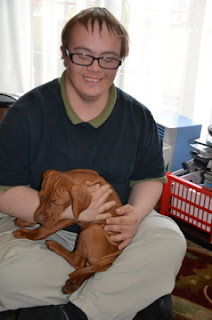This video showing a trainer mistreating his German Shepard in preparation for the World Championships for Utility Dog is disturbing to say the very least.
It appears as a result of its posting on its Facebook page, the Federation Cynologique Internationale (FCI) has posted the following statement in many languages:
FCI - Federation Cynologique Internationale firmly opposes Dog Cruelty
In the light of a serious incident that took place in Zalaegerszeg (Hungary) during the training session on the occasion of the 2012 FCI World Championships for Utility Dogs (from 20 until 23rd of September 2012), the FCI and its General Committee have agreed with the disqualification pronounced by the FCI Commission for Utility Dogs against the author of the very unfortunate and unacceptable behaviour. According to its mission statements, the FCI wishes to reiterate its firm opposition against any dog cruelty and any person committing such abuses will be penalized.
La FCI - Federation Cynologique Internationale se indigna contra la crueldad hacia los perros
La FCI - Federation Cynologique Internationale s’insurge contre toute cruauté envers les chiens
A continuación de un incidente grave que ocurrió en Zalaegerszeg (Hungría) durante un entrenamiento para el Campeonato del Mundo 2012 de la FCI para Perros de Utilidad (del 20 al 23 de septiembre de 2012), la FCI y su Comité General aprobaron la descalificación dictada por la Comisión de la FCI para Perros de Utilidad en contra del autor de este comportamiento especialmente lamentable e inaceptable. Conforme a su política y misión, la FCI desea repetir su oposición firme contra cualquier tipo de crueldad hacia los perros. Cualquier persona culpable de esos actos será sancionada.
Die FCI - Federation Cynologique Internationale lehnt jede Art von Grausamkeit gegenüber Hunden scharf ab
Aufgrund des ernsten Zwischenfalls beim Training anlässlich des FCI-Weltchampionates 2012 für Gebrauchshunde (20. - 23. September 2012) in Zalaegerszeg (Ungarn), heissen die FCI und der FCI-Vorstand die von der FCI-Gebrauchshundekommission ausgesprochene Disqualifikation eines Hundeführers wegen seines nicht akzeptablen Verhaltens gut. Aufgrund ihrer "Mission-Statements" betont die FCI, dass sie jede Art von Grausamkeit gegenüber Tieren strikte ablehnt und dass Vorkommnisse dieses Art von ihr sanktioniert werden.
La FCI - Federation Cynologique Internationale s’insurge contre toute cruauté envers les chiens
A la lueur d’un sérieux incident ayant eu lieu à Zalaegerszeg (Hongrie), lors de la séance d’entraînement à l’occasion du Championnat du Monde 2012 de la FCI pour Chiens d’Utilité (du 20 au 23 septembre 2012), la FCI et son Comité Général ont marqué leur accord quant à la disqualification prononcée par la Commission FCI pour Chiens d’Utilité à l’encontre de l’auteur de ce comportement particulièrement malheureux et inacceptable. La FCI souhaite réitérer sa ferme opposition contre toute forme de cruauté envers les chiens et toute personne se rendant coupable de tels actes sera pénalisée.



